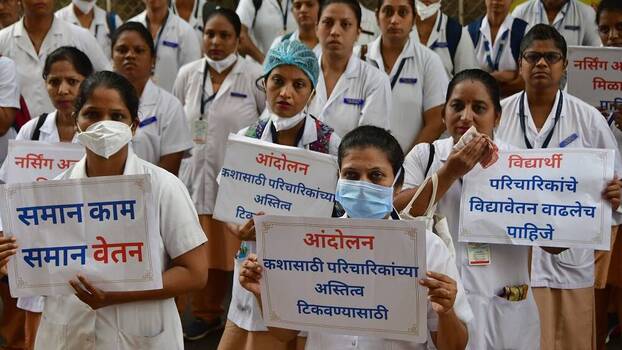
Healthcare has become a lucrative growth market for investors around the world. In India, this sector continues to be further commercialized, supported by both international development institutions and many domestic governments. Private development investments from international, bilateral, and multilateral Development Finance Institutions (DFIs) have grown six-fold between 2000 and 2017. As of 2021, the global DFI portfolio for healthcare investment reached 84 billion US dollars, almost half of the world’s Official Development Assistance (ODA).
Abhay Shukla and Shweta Marathe work with the civil society organization SATHI, which works on health rights in the context of public and private health care in Maharashtra, India
Private investment in healthcare provisioning and financing is often presented as the only viable solution to address disparities in healthcare provisioning and to reduce the financial burden of out-of-pocket expenditures. However, this argument overlooks the evidence from around the world which contradicts this perspective.
Promoting the Private Sector
The justification for promoting private investment in social sectors, including the health sector, comes from different levels.
First, it is considered a necessary strategy to bridge the annual 2.5-trillion-dollar gap required to achieve the targets of Sustainable Development Goal 3, “ensuring healthy lives and promoting well-being”. Private sources of finance are instrumental in meeting this goal.
Second, private healthcare providers are considered major contributors to expanding healthcare access to for populations in low- and middle-income countries (LMICs), and private sector investments are essential for promoting growth of this sector. A recent report by KPMG and academic researchers on behalf of the World Innovation Summit for Health suggests that achieving Universal Health Coverage (UHC) by 2030 will be challenging without utilizing existing private capacity, investment, and innovation.
Third, it is important to note that the National Health Policy (NHP) of 2017 encourages private investments in India. Furthermore, reports published by National Institution for Transforming India (NITI) Aayog in 2021 openly promote the growth of the private sector, encouraging both transnational and domestic investments in the Indian healthcare industry.
The Unique Role of DFIs
DFIs are unique transnational investors. While they are commercial enterprises, DFIs also claim to play a developmental role in supporting private investments in LMICs to realize Sustainable Development Goals (SDGs).
Most DFIs maintain multiple objectives and often include “sustainable private sector projects; maximising impacts on development; remaining financially viable in the long term; and mobilising private sector capital in high-risk markets globally”. DFIs are well-positioned to play a significant role in strengthening the private sector since this is their core mandate. They support economic growth in developing countries by mobilizing private investment through financing, risk-sharing, and support activities, making them vital contributors to this cause.
In recent years, a number of scholars as well as civil society representatives have noted the potential negative effects of relying on private actors in healthcare to achieve public objectives, including during the COVID pandemic. Various stakeholders and analysts have highlighted the potential risks associated with a for-profit private sector and market-focused international development approach, which may divert Official Development Assistance (ODA) from local priorities and can undermine the role of public goods and services in promoting economic development. However, this area requires further analytical attention and research to understand its impact fully.
Why This Study?
International development agencies are investing in the private healthcare sector in India with a claim to promote universal, affordable, and high-quality healthcare. However, there is limited research on how these investments actually impact access to affordable healthcare and progress towards SDGs.
German developmental agencies including German DFIs have made significant investments in India’s private healthcare, similar to other DFIs such as British International Investment (BII), International Finance Corporation (IFC), and the World Bank. But evidence regarding the impacts of German developmental agencies’ financing to the private healthcare sector in India is scarce.
During the COVID-19 pandemic, concerns related to affordability and access to healthcare were further highlighted in context of commercial for-profit and corporate private hospitals. Therefore, a concrete analysis is needed to assess the impact of these investments in the health sector to determine whether these are actually strengthening movement towards public health goals and ensuring universal and equitable access to healthcare.
Supporting Profits or Patients?, a new study from Indian NGO Support for Advocacy and Training to Health Initiatives (SATHI) sponsored by the Rosa Luxemburg Foundation, was conducted to understand the trajectory and current landscape of financial commitments by German developmental agencies in the Indian private healthcare sector. The study aims to identify key concerns from patient and community perspectives, and to examine the claims that these investments contribute to the development of UHC systems as articulated in various concerned documents.
The study critically analyses the engagement of German developmental agencies’ financial commitments with private healthcare providers in India, and attempts to offer insights into their impacts on access to healthcare with an equity lens. While much of the current research on DFIs in LMICs is led by researchers from the Global North, this study is unique in that it was conceptualized and implemented by researchers based in India, while consulting with colleagues from various parts of the world.
The study’s findings aim to increase awareness and foster dialogue on this theme among various stakeholders, such as civil society activists, healthcare professionals, academics, and policymakers. Furthermore, the study provides recommendations for both German and Indian government actors regarding orientation of GDFIs towards effectively promoting equitable and affordable access to healthcare in India.